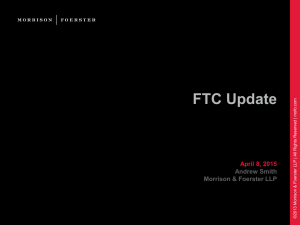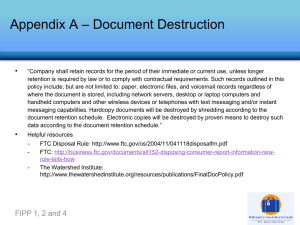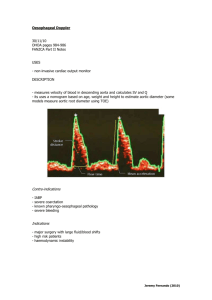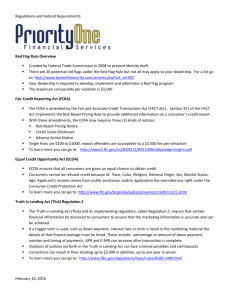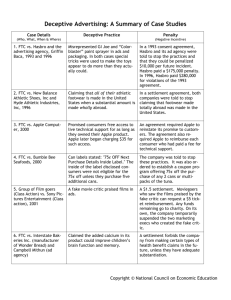Federal Trade Commission Privacy Law & Policy
advertisement
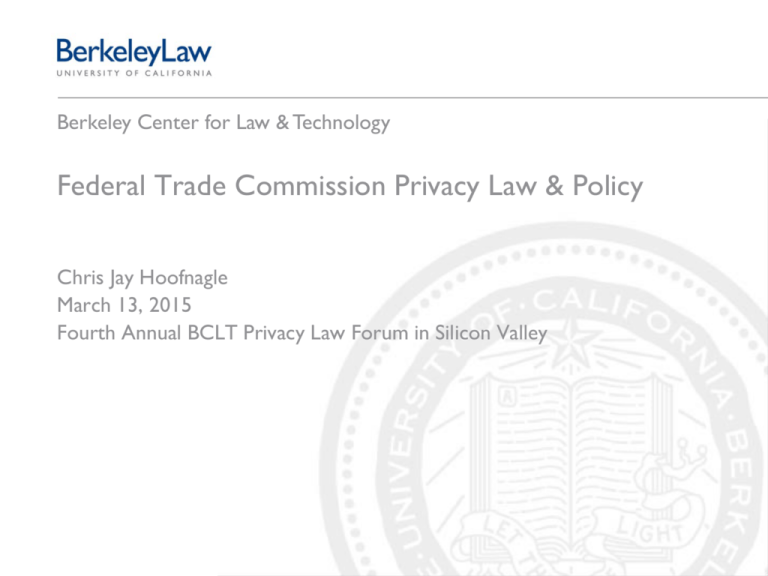
Berkeley Center for Law & Technology Federal Trade Commission Privacy Law & Policy Chris Jay Hoofnagle March 13, 2015 Fourth Annual BCLT Privacy Law Forum in Silicon Valley Our Experts • Laura Berger, attorney FTC’s Division of Privacy and Identity Protection • Thomas P. Brown, Partner, Litigation Department, Paul Hastings LLP Our Experts • Lydia Parnes, Partner, WSGR and former FTC Bureau of Consumer Protection Director • Jeffrey Rabkin, Special Assistant Attorney General, California DOJ Historical Lenses • • • • • • • • • Creation of the FTC The specter of the common law Meatpacking report Second wave consumer protection (1930s) Cigarette rule ABA Report/Nader Raiders/Posner’s Critique KidVid (third wave consumer protection) The Miller years Online privacy (a fourth wave?) Historical Lenses Creation of the FTC The specter of the common law Meatpacking report Second wave consumer protection (1930s) Cigarette rule ABA Report/Nader Raiders/Posner’s Critique KidVid (third wave consumer protection) • The Miller years • Online privacy (a fourth wave?) • • • • • • • FTC: A Child of Quarreling Parents • Turn of the century tremendous public concern about “bigness” • All three political parties call for a trade commission in 1912 “Patent” Medicines • First wave consumer protection • Significant business effort to stop selling of scary products by competitors Printers’ Ink Statute • Created criminal liability for false advertising • Was strict liability • Promoted by advertisers • Was a failure Necessary Elements • • • • • The need for expertise The need for more certainty The need for flexibility The need for quick, preventative action The need for compromise Big Business • Regulate and supervise it? • Prosecute it? • Provide advice to companies and to the public about it? George Rublee • Convinced Brandeis (and later President Wilson) that a general ban on unfair competition paired with a strong agency was the proper approach Creation: Lessons • Legislative compromise created a superagency, like nothing before in history • Arguments about the agency giving advice versus policing the marketplace are 100 years old • Wilson, Brandeis and Congress did agree that the FTC should have a flexible, evolving power to police the marketplace Cigarette Rule • Pre-Rule: Congress amends the FTC Act to explicitly allow the FTC to police “unfair or deceptive acts or practices” • Accompanied by rise of “consumerism” The FTC’s Warning • “CAUTION: cigarette smoking is dangerous to your health and may cause death from cancer and other diseases” – Drafted by Richard Posner! And Philip Elman <Tobacco Congressional Reaction • “Cigarette smoking may be hazardous to your health.” • The blowback included a bar on the FTC from specifying stronger warnings on packs or advertising • Preempted the states from similar measures. Cigarette Rule Lessons • The FTC can be punished for good work – Other examples: Meatpacking report (1920s), Baby Blankets, etc. • The FTC had more vision than the cigarette industry—how could smokers in the 1980s and 1990s have claimed that they did not know that smoking was dangerous, had the FTC’s warning been adopted? KidVid • 1970s attempt to address problem of advertising to children, mixing content and advertising, directly advertising vitamins to children • Book’s contribution: KidVid was started by anti-regulation republicans and egged on by Congress throughout the 1970s “When you sell a woman on a product and she goes into the store and fins your brand isn’t in stock she’ll probably forget about it. But when you sell a kid on your product, if he can’t get it he will throw himself on the floor, stamp his feet, and cry. You can’t get a reaction like that out of an adult.” With children, the problem is to reach the head through the emotions…Animation is credible. Animation tends to be trusted even by most of the more critical children. KidVid Proposal • Comment on: • Ban all advertising on programming directed to kids under 8 years of age • Ban advertising for sugared food on programming directed to young adolescents • Require balanced advertising of more healthful foods KidVid Reaction • Along with funeral rule and used car rules, triggered a strong reaction • Congress shut down the FTC, twice • Agency struggled to renew appropriations for decades • Congress banned FTC from any advertising rulemaking for 2 years KidVid Lessons • The FTC’s legal authorities, greatly strengthened in the 1970s, remained intact – Congress chastises the agency for policymaking activities but almost always is expanding its enforcement authority • KidVid is a primal fear in the mind of the agency • Some problems might be too big for the agency… – Privacy probably okay – Ad policy, substantiation more vulnerable Draft Policy Ideas • • • • • Public Choice & CBA Data Security Cases Security breach notification COPPA Section 5 as privacy regulation Public Choice Critiques • The FTC is the agent of large enterprises, creating regulations to help the big squash the small • The FTC uses small-business rhetoric to justify actions that help large businesses • The FTC Act was passed to benefit monopolies and help them control smaller, cutthroat firms • That FTC employees increase complexity of regulation so that they can command high prices when they leave the agency for private practice The Public Choice Theorists • “Even in some of the best scholarship on regulation, failure has often been applied…as a conclusion but also as a premise…” – McCraw • “Indeed, her [Hannah Arendt’s] theories of political action are more consistent with my own experiences than are ''interest group'' theories.” – Stephen Breyer CBA by Chairman Miller • Performed CBA on telemarketing regs • Calculated cost of predictive dialer regulations would be $19 billion – But failed to consider the benefit to consumers of fewer interruptions • Also analyzed cost of preacquired account number regs at $1.5 billion – But failed to factor in costs of fraud enabled by liberal account # sharing “Cost Benefit” Analysis • CBA is a good thing, but… • Calls for “rigorous” and “sound” economic analysis are code for “find any rationale for the proposition that FTC action is perverse” • Almost always assume that consumers time and transaction costs are worth $0 • Almost always neglect other costs or other savings, often ignoring the very point of the regulation FTC Data Security Cases • FTC’s focus on merchants not protecting card data lacks a structural view of insecurity • Retailers are “set up to fail” by the insecurity of the card system • Retailers thus *triple* victimized – Forced to adopt flawed, secrecy-based security – Are targeted by hackers, then by the FTC, AGs Rethink Security Breach Notification • Purpose of SBN was to use reputation to internalize costs of insecurity • Notice is thus is means, not an end • What alternatives would cause internalization of insecurity? • Still have notice for specific kinds of breaches (e.g. targeted invasions of privacy) COPPA • Children’s privacy law motivated by both privacy and online safety – This created a kind of pathology in the statute • Parental consent – Expensive, difficult to comply with – Causes bi-modal compliance with COPPA – Children easily circumvent – Doesn’t stop predators COPPA Privacy v. Security • We need to rethink whether COPPA’s safety and privacy goals are compatible • COPPA’s privacy really is in the statute’s other provisions: limits on collection, limits on retention, etc Privacy: §5 Dynamics • Section 5 was tempered through 60 (maybe 100) years of false advertising cases. • What barnacles have these advertising cases attached to §5? • Should they stick to information policy, which is very different from formulation of advertising? Federal Trade Commission Privacy Law and Policy Forthcoming 2015 Cambridge University Press Our Experts Laura Berger FTC Thomas Brown Paul Hastings LLP Lydia Parnes WSGR Jeffrey Rabkin California DOJ

